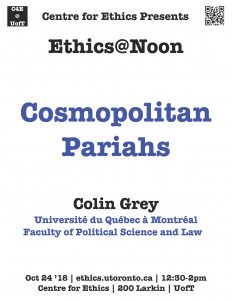
Cosmopolitan Pariahs: Exploring the Moral Rationale for Withholding Protection from Criminal Refugees
Article 1F of the 1951 Convention relating to the Status of Refugees excludes from refugee protection persons guilty of serious international and domestic crimes. Excluded persons are not eligible for refugee status even if they face a well-founded fear of persecution. This paper asks whether a coherent rationale for such exclusion is available, focusing on the influential—and strikingly unexamined—suggestion by UNHCR that Article 1F serves to exclude persons who are “undeserving” of refugee protection. If refugees are persons threatened with violations of their basic human rights, as several philosophical and legal accounts hold, we must ask: What could possibly justify abandoning them to their fate? I will argue that exclusion of refugees for past criminality is best explained as the institutional expression of a form of blame that is appropriate if we accept that all human beings on the Earth exist in a juridical relationship of cosmopolitan right, a Kantian construct that is plausibly seen as the animating idea behind the international refugee regime. The construal of the exclusion clauses as an institutional expression of blame, however, is ultimately inconsistent with a strong human rights reading of the international refugee regime. Instead, the exclusion clauses suggest refugee law represents an institutionalized form of humanitarianism. In other words, the ultimate claim of this paper is that we must choose between exclusion and a strong human rights reading of refugee law. We cannot have both.
☛ please register here
Colin Grey
Université du Québec à Montréal
Faculty of Political Science and Law
Wed, Oct 24, 2018
12:30 PM - 02:00 PM
Centre for Ethics, University of Toronto
200 Larkin
